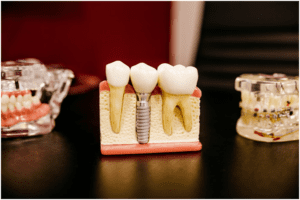These 4 Signs Could Mean Your Wisdom Teeth Are Impacted

Wisdom teeth are the last set of teeth to come in. Also known as third molars, these four teeth usually erupt through the gumline between the ages of 17 and 21, although some people will get their wisdom teeth earlier or later.
Our ancestors had larger jaws that easily accommodated these third molars. Today, our jaws are smaller and our diets are different, so there isn’t as much of a need for these last four teeth.
Millions of people have their wisdom teeth removed every year as the result of complications from impaction. But what exactly are impacted wisdom teeth, and what are the signs? Here’s what you should know when it comes to problems with those third molars in the back of your mouth!
What Are Impacted Wisdom Teeth?
Impacted wisdom teeth are actually stuck in your jaw or gum tissue. They may be coming in the wrong way—such as horizontally—and never erupt through the gumline, or they only partially come through the gums.
The cause of impacted wisdom teeth is usually genetics—whether your jaw is too small for the wisdom teeth to come in all the way or the wisdom teeth are growing in the wrong direction, there’s not much you can control when it comes to how your wisdom teeth grow.
Wisdom teeth that are impacted don’t always cause problems, but for many patients, impacted wisdom teeth disrupt the health of their smile. Here are the top five signs and symptoms that your wisdom teeth could be impacted!
- TMJ Symptoms
Your temporomandibular joints, commonly referred to as TMJ, are located on either side of your head close to your ears. For some people, an improper bite, genetics, or bruxism (teeth grinding) can cause pain and inflammation in the TMJ, leading to a variety of symptoms.
Because the wisdom teeth are located back in the mouth near these joints, impacted wisdom teeth may also cause TMJ-like symptoms. These symptoms could include:
- Jaw pain or soreness
- Headaches
- Jaw stiffness
- Difficulty opening and closing your mouth
Whether or not you’ve had your wisdom teeth out, these symptoms need to be evaluated by your Asheville dentist. Your temporomandibular joints may be the culprit, or you could have impacted wisdom teeth that are negatively affecting these complex joints in your jaw.
Since your jaw joints are so complex, different problems in the oral cavity can affect the joints and create symptoms that can be difficult to diagnose. An experienced dentist can help you determine the root of the problem!
2. Ear Pain
Did you know that ear discomfort can be related to your temporomandibular joints and may even be the result of impacted wisdom teeth? This is because your wisdom teeth and jaw joints are located so close to the ears.
Discomfort from impacted wisdom teeth may affect your ears, causing an earache. Problems with both your jaw and ears can make it difficult to determine the origin of your pain. If you’ve had problems with your ears without successful treatment from your physician, it could be time to see your dentist in Asheville, especially if you have impacted wisdom teeth.
3. Gum Issues
Problems with your gum tissue are the most common symptoms of impacted wisdom teeth. When wisdom teeth only partially come through the gumline, a portion of each tooth is still covered by a flap of gum tissue. This not only makes it difficult for you to clean your teeth, but can cause bacteria and food particles to build up underneath the gum tissue, which can lead to an infection.
Periodontal problems as the result of impacted wisdom teeth are referred to as pericoronitis. Symptoms of pericoronitis could include:
- Swelling gums near your wisdom tooth or teeth
- A bad taste or smell in your mouth
- Bleeding or tender gum tissue
- Swollen lymph nodes
For some patients, symptoms of pericoronitis are temporary, as the wisdom teeth may be still in the process of erupting fully through the gum tissue. However, if these molars never fully come in, you may need to consider extraction or other treatment as recommended by our general dentistry in Asheville.
.
4. Trouble Biting or Chewing
Some patients have trouble biting down on their wisdom teeth or chewing on the side of their mouth that has an impacted wisdom tooth. Pain when biting down on an impacted wisdom tooth is actually another symptom of pericoronitis, which could mean your gum tissue has been affected by your wisdom tooth.
Any pain that you have when biting or chewing, including an aching tooth, could be indicative of an infection or another problem with your smile, and should always be evaluated by your Asheville dentist!
Treatment for Impacted Wisdom Teeth
Whether you have intermittent symptoms of impacted wisdom teeth or continuous discomfort, you’ll need to have a dental exam and x-rays to determine if your wisdom teeth are impacted and could be causing the problem.It can be treated at Asheville Dental Clinic.
Every smile is unique, so your treatment options for impacted wisdom teeth may vary. However, many cases of impacted wisdom teeth will require extraction to fully solve the problem. Your dentist can let you know what your treatment options are during your appointment!
Could Your Wisdom Teeth Be Impacted? We Can Help
Many people can keep their wisdom teeth without any problems. For others with symptoms of impacted wisdom teeth, extraction may be necessary to help you feel better and get your smile back to normal! If you’re having any of the above symptoms, our team at Saunders DDS can help. Schedule an appointment with us by calling (828) 277-6060 or by requesting an appointment online!
Book a dental appointment to safeguard the health of your wisdom teeth and promptly address any wisdom tooth cavities. Call us today at (828) 277-6060.
